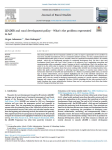Johansson J., Holmquist M. (2024). LEADER and rural development policy - What's the problem represented to be? Journal of rural studies, 01/05/2024, vol. 108, p. 103287.
https://doi.org/10.1016/j.jrurstud.2024.103287
https://doi.org/10.1016/j.jrurstud.2024.103287
| Titre : | LEADER and rural development policy - What's the problem represented to be? (2024) |
| Auteurs : | J. Johansson ; M. Holmquist |
| Type de document : | Article |
| Dans : | Journal of rural studies (vol. 108, May 2024) |
| Article en page(s) : | p. 103287 |
| Langues : | Anglais |
| Langues du résumé : | Anglais |
| Catégories : |
Catégories principales 05 - DEVELOPPEMENT RURAL ; 5.1 - DéveloppementThésaurus IAMM POLITIQUE DE DEVELOPPEMENT ; POLITIQUE DE SOUTIEN ; PROGRAMME DE DEVELOPPEMENT ; AIDE AU DEVELOPPEMENT ; DEVELOPPEMENT RURAL ; PROGRAMME LEADER ; EUROPE |
| Résumé : | This article problematizes the EU Programme LEADER as a policy to improve opportunities to live and thrive in rural areas. LEADER was initiated in 1991 as a Commission initiative and has, over time, expanded and become an institutionalized public policy in the EU. LEADER is based on a particular development method - the LEADER method - which sets out fundamental principles for conducting development work. The idea is that rural development should start with Local Action Groups at the grassroots level, emphasizing networking and entrepreneurship within a geographic context. Drawing on Bacchi's methodology, What's the problem represented to be, the article aims to examine the LEADER Programme and analyze problem representations and political rationalities. The analysis shows that actors working within LEADER have developed political rationalities that partly constitute obstacles to achieving long-term impacts. It concerns issues related to the bureaucratic framework of LEADER and representations on a fixation on producing added values, an internal logic of project administration, and an emphasis highlighting the role of the individual entrepreneur. The LEADER Programme has not only been institutionalized as part of the EU and member states' administrative systems. Still, it has also created its ideological superstructure consisting of a specific narrative, methodology, language, and common forms of organizing. This gives LEADER advantages but also risks associated with internal closedness that creates subjectification between ?them and us' and produces lived effects that hinder structural changes promoting rural areas. |
| Cote : | En ligne |
| URL / DOI : | https://doi.org/10.1016/j.jrurstud.2024.103287 |







